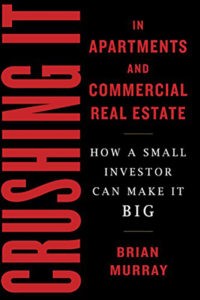Listen to the podcast here:
Transitioning from one trade to another is not an easy task especially when you are jumping into the multifamily real estate industry. Brian Murray, the Founder and CEO of Washington Street Properties, talks about his shift from the tech sector to multifamily real estate. Helping people to jump in and not be intimidated by the real estate world, he shares some tricks on how he made his business work and explains how mistakes can drive you towards learning more about the industry, ultimately revealing why he opted to move to syndication. Brian points out that the greatest contributor to his success was surrounding himself with knowledgeable people that helped him along the way.
Our Gracious Sponsor:
Are you wanting to learn how to gain financial freedom through having your own syndication business? Text LEARN to 474747 to begin to learn from one of the best in the industry, Vinney Chopra. Vinney came to the US with only $7 in his pocket, and now controls hundreds of millions of dollars of real estate he has acquired through multifamily syndication. He is now personally coaching others to do the same. Text LEARN to 474747 to begin your journey to starting your own syndication business! Vinneychopra.com
—
Watch the episode here:
Brian Murray on How To Grow Your Multifamily Real Estate Business
Our guest is Brian Murray. Thanks for being on the show.
Thanks for having me. I’m really excited to be here.
I met Brian at a mastermind and I was impressed at his level of success in the multifamily industry, his ability to be able to jump into this industry and helping others do the same is impressive. Brian is the Founder and CEO of Washington Street Properties, a commercial real estate investment and property management company that has been ranked on the Inc. 5000 list of the nation’s fastest-growing private companies for five years in a row. Brian was recognized with a gold Stevie Award for Executive of the Year in the real estate industry. He is the author of the bestselling and award-winning book, Crushing It in Apartments and Commercial Real Estate, which has sold more than 50,000 copies since publication. I am honored to have you on the show. Give the audience a little more about who you are.
I started back in 2007. I put my first property under contract. I was a teacher at the time and I was looking to supplement my income and I’d always been fascinated by real estate. I started looking at properties and took the somewhat unusual step that my first property was a 50,000 square foot office building. I got a great deal on it and I jumped right in with both feet. I had no idea what I was doing but I managed to figure it out along the way. That property was a lot of work and it was difficult to turn around but I was able to do that. A couple of years later, I picked up my second property, another turnaround project and three more after that. At this point, I’ve grown a pretty good size multifamily in the commercial portfolio. We’ve got a $55 million portfolio that we own and operate. We actually did not raise money for any of that. We were able to add value property by property and refinance those properties, pull cash out and buy the next ones. It’s only been over the past year that I’ve really gotten to understand syndication and have started to look at doing that myself.
A $55-million portfolio without syndicating anything, that’s very impressive. I want to back up a little bit. You were a teacher and you got into real estate and a lot of people are probably in that same boat where they’re working full-time and they want to get into real estate. Can you elaborate on that a little bit and that process? Your first property, it wasn’t a duplex or a single-family home either. Maybe you can elaborate on how did you have the confidence or the education to jump into that type of property right off the bat even while working full-time.
I’m not going to say it wasn’t scary. It definitely was. I hadn’t had a career change. I had worked in the tech sector and had a little bit larger income. What I really became concerned about, I was noticing that the savings that I had accumulated over the years was gradually dwindling away instead of growing and nobody wants to see that. I knew I had to make a change and turn that around. Real estate seemed like the way to do that. I knew that owning real estate for my own personal use was not a good thing in terms of how that consumed my resources. I looked at rental properties and said, “This is the way I can shift my money into that, then it will pay me.”
I wanted to see my net worth grow every month and real estate seemed perfect for that. Of course, I started looking at single-family homes, duplexes and reading as many books as I could. I looked at a lot of properties. I looked at properties for probably six months until I realized that with larger properties, I found better returns. I kept reading more books and at one point, a broker came to me and said, “I’ve got a pretty large property here. I know it’s outside of the range of what you said you could afford, but they’re willing to work with you and they might be able to do owner financing.” It seemed like an abstract concept up to that point but once it was brought to me, it definitely seemed real and that particular property didn’t work out for me.
I realized that there are ways to get into much larger properties even if you don’t have 25% down. Ultimately, the property that I ended up buying, I was able to assume the mortgage on that. I took literally all of my savings at the time. I even cashed in my retirement account, which I’m not advocating but that’s what I had to do. I was convinced that I could make this work. I saw all the waste at this property and I knew that some of the things that were going on weren’t right and I could change it. I decided, “It’s time to make a change and make things better.” This was the path that I’ve found. I leaped in and I’m not going to pretend I was a super brave soul that didn’t have a lot of fears. I did pull the trigger and thankfully it worked out.
[bctt tweet=”You do not have to do it alone. You can always delegate some tasks.” username=””]
You were brave, no doubt, to have cashed out your retirement and put your savings in as well.
One of the things that were reassuring is I began to realize that you don’t have to do it on your own. Almost anything that I couldn’t figure out as I analyzed it, I realized that I could ask somebody else. I could pick up a phone and call somebody. If there was one thing that was reassuring, it was the fact that you can track somebody down to answer almost any question or help you get through almost any problem you might find. The more I realized that, it gave me a little more confidence that maybe I can pull this off.
I haven’t really heard anyone say that like that. When you’re first getting started, there are times you feel like you’re by yourself. You don’t know who you would even ask. There are people that are willing to help and that’s incredible. Almost any problem that you face, obviously there are people that have already been in your shoes, in that place that had that specific problem and finding them or finding someone that’s ahead of you that can help you through that issue.
In my book, I had equated the boiler and utility room at this property to a spaceship when I walked in and it might as well have been. There were controls everywhere and dials, knobs and levers. I had no idea what I was looking at but I could pick up the phone and call somebody who’s specialized in that and they could come in, immediately explain things to me and fix any type of problem. By the time I had the property for a few weeks, I was able to actually turn the boiler on and off and even though when I first walked in, I didn’t even know what that thing was.

You mentioned in your book, you help people to be able to jump in and not be intimidated. That’s what you did, you jumped in. I would almost bet that that’s one reason why you were successful because you went all in. You didn’t dabble a little bit but by putting your retirement and your savings in there, you were committed. You didn’t have an option for this to fail.
No, I absolutely didn’t. I do believe that if I could pull that off, anybody else could, too. It’s really a mindset. I was fortunate to have this epiphany that these large properties, this is something I could actually own. This is something I could do and that was a change for me. I know that there are so many people out there who are toying with this idea and they don’t think they can do it when they could probably do it better than I did. What I think is important to understand is know what you’re signing up for. I don’t, in any way, want to say that it’s easy. If somebody wants to do it, you’re going to have to jump in with both feet and that means rolling up your sleeves and doing a lot of work.
I spent countless hours reading, listening to podcasts, educating myself and talking to people. That’s not even touching all the work that I had to do on the property itself, leading up to the acquisition and making the acquisition because I actually manage the property myself as well. That’s part of how I made it work. There was too much at stake. I had everything on the line and I wasn’t ready to trust that by outsourcing it to a property management company. I had no problems getting help but I wanted to be there to oversee things. I wanted to be close by so that I could check on things every day and roll my own sleeves up, pick up trash, do the yard work and do everything I could to make that work.
How soon from purchase until you left your W2 job?
[bctt tweet=”It is important to understand that you know what you are signing up for.” username=””]
I grew my company for seven years until I left my W2. It’s ironic because I wanted to do this for the extra income but as I began to turn the property around, I realized how important every single dollar was to making this property cashflow and grow my real estate business, I became stubborn about making sure I did not take money out of my business. I really did not want to leave my W2 and I enjoy teaching. I found it very rewarding. Actually, at one point, my intent was to hire a CEO. I did have somebody do that for a while and it wasn’t the same. My company had grown to the point I had quite a few employees that were counting on me. Eventually, I didn’t have a choice. I knew that I was not willing to do both and have to not do them well. I reached that point and I said, “I can’t give both of these my all and do a good job at both,” I knew that one had to be set aside and I wasn’t about to set aside my business that I’ve worked so hard to grow. Unfortunately, I stopped teaching.
Most people are wanting to leave their W2 as fast as possible but in your case, it was a necessity to keep this business going the best that it can and for you to be in it. You have to be to make it happen, you had to leave the W2 and you had to make a choice.
If you leave your W2 and you lose that income, you do make it harder to grow your business. That business is going to have to feed you in addition to itself. In my opinion, if you’re really serious about growing your real estate business as large as you can, you want to hang onto that other source of income for as long as you can so you don’t have to siphon money off of your business.
Brian, talk to the audience who are on the fence from jumping in and maybe they feel intimidated. I felt like you can speak to that from your experience and you’ve written a book that covers it as well. Help us to be able to jump in like that and give us some more details or examples maybe so we can do the same.

First off, you don’t necessarily have to manage your own property. That makes it even more demanding. There’s this mindset out there that you have to start small. You have to start with a duplex or start even with a single-family home. As someone who’s gone through it and has owned a lot of properties at this point, I will tell you that there’s not that much difference if you have experience with a single-family home and you can figure that out. You could do the same with a fifteen-unit apartment building. The resources, the books and the podcasts are out there. Anyone has to step up, that means that they’re taking that action to learn how to do it, get more comfortable and learn what they don’t know. If you’re waiting until you think you know everything, then that’s not going to work either. You actually have to be comfortable saying you’re going to make mistakes. I make mistakes every day. Part of it would be accepting out up front and say, “I know I’m going to make mistakes. I know I’m going to have setbacks. I know something’s going to happen I didn’t anticipate but I’ll get through it. I have confidence that I could work my way through it, I can bring somebody else on board or consult with somebody who has been through it. They can help me to avoid as many of those mistakes as possible and work through them when they happen.”
You have to have that mindset of knowing that it’s going to happen. Accepting that you’re going to make mistakes. I liked how you said that and it reminds me, I liked this analogy. Terrell Fletcher, he is a professional football player. He spoke somewhere at a conference one time and he was talking about mindset. As far as in football, he related it to the football team to be successful, they have to love the process because they know what’s at the end. They know they’re going to win if they love the process. He said, “If that means the process is getting hit in the face ten times, then let’s get started now.” He knows at the end of that tenth time, he’s going to make it, he’s going to be stronger and he’s going to succeed. You’ve got to be willing to get hit in the face a few times. You have to love the process. You have to know you’re going to make mistakes and accept that. This also relates to how you’ve got to be willing to make a phone call. You’ve got to be willing to reach out to some others who have been there.
You can’t be afraid of rejection. You’ve got to know that you’re going to have to try and try again and eventually you’re going to get there.
Is there an example that you could give us as you were going into this process, a mistake that stands out or sometime were you were like, “I’ve got to find somebody to help me with this,” or something that was happening?
[bctt tweet=”You will eventually get to your goal by trying and trying again.” username=””]
My difficulty in answering that actually has nothing to do with not being able to find one. It has to do with the fact that they do happen every single day. You should reinforce it. It’s definitely not something that you want to plan to do alone and having that self-awareness right up front to recognize what your limitations are is another important piece of that. If you can’t recognize that, for instance, this is some pretty complicated legal work, it’s time to get an attorney involved. You don’t want to enter with this illusion that you’re capable of doing everything. Being humble about that and self-awareness is important. Almost everything that I did for quite some time had to have somebody involved. There’s no one single thing that stands out.
Through that process, you’ve learned a lot and your problems have changed. It’s going to be a different set of problems but with the mindset that you’ve instilled and that you have because of all those little problems back to back, these big ones now don’t probably seem as big.
You become accustomed to it. You come to expect it. If you think you have a day where you don’t have a setback or something doesn’t go wrong, then you’re surprised because it doesn’t really happen and it probably means something did go wrong or you don’t know about it yet. That was part of my real motivation for writing the book. I’ve made so many mistakes. I wished someone had chronicled all the things they’ve learned, all the mistakes they’d made that they could have shared with me and help me avoid some of them. The teacher in me wanting to help as many people learn as possible. That’s what prompted writing the book.
You’ve built a successful business, you’ve done really well in real estate already and you’re moving towards syndication. Why move towards syndication? Why not keep doing what you’re doing and keep growing that direction?

It’s one that I’ve wrestled with a lot. The biggest reason I’ve jumped in and learned everything I could about syndication and met some great people such as yourself is at some point, it does become challenging to maintain the growth rate that we’ve experienced with the size that we’ve achieved without bringing any type of outside capital. We’ve reached that phase where we have to either accept that we’re going to grow a lot slower than we have historically or we are going to open that up and provide opportunities for investors to come in. It could also be rewarding to help others who invest and achieve those goals. There are a lot of tradeoffs with that. We haven’t actually syndicated a deal yet. That’s the reason why and the flip side of that when you syndicate, it does have some limitations in terms of if you lose that flexibility in terms of reinvesting all that cash back into the property.
Investors want to be receiving returns on that investment early on hopefully, throughout the life of the project. Sometimes in our experience, a project maybe can unlock even greater value if you continue to reinvest that money back in. You have the patience to wait and see that large return down the road. It’s by no means an easy decision. We haven’t actually done syndication yet, but I have so much respect for all the syndicators out there and I’ve learned a lot from them. It’s been very interesting to be involved in the underwriting process on some of these projects, to have the opportunity to share our experience with syndicators and seeing that other model and how it is put together and implemented.
From your experience, you’ve gained a lot of experience in multifamily, commercial property and you’re learning a lot about syndication and possibly moving that direction or are adding that to your business. You’ve got 30 seconds with somebody or maybe a minute, and they asked, “Brian, what’s the best way to get started? What are a couple of things I should be doing to get into this industry or to learn this business?” What do you tell them?
Read as many books, listen to as many podcasts and surround yourself with as many knowledgeable people as you can. I’ve had such a great experience with the mastermind that I’m in. I met some great friends, good people and there are so many forums out there that you can attend. Attend your local meetup, meet other people who are trying to do or are already doing what you’re doing. That can be so inspiring to surround yourself with people who are already doing or want to do exactly what you want to do.
[bctt tweet=”A project can unlock greater value if you continue to reinvest that money back in.” username=””]
What’s the number one thing we could do to improve our business or maybe some way that you’ve improved yours?
Let’s not forget that tenants are customers and they are people. It can be very easy as an investor to look at your spreadsheet and see numbers and forget that the tenants, we like to call them residents and instead of apartments, homes or residences. If you keep that in mind and you remember that these are your customers and they’re the ones who are putting all the money, then that’ll affect your decision-making process. It will make sure that you operate with a high level of integrity and with customer service. Those will ultimately pay you back in the long run and make you the most successful you can be.
You get caught up on the business side. You get down looking at spreadsheets and all of a sudden, you forget, “Let’s think about if I was a tenant in that building.” Brian, what’s the number one thing that’s contributed to your success?
I can’t take credit for it myself. It’s all the people that have helped me along the way. It would be the employees that I’ve had, the tenants that I’ve had, the contractors, all the service providers, every time I’ve needed help, there’s been somebody there. I get all the credit, but I don’t deserve the credit.
It is a team sport. How do you like to give back?
There are a lot of little things we do but I’d have to say two ways. Our tagline at my company is, “Making the world a better place, one square foot at a time.” We really like to look at what we do as providing clean, healthy homes, great places for people to live. They’re getting the best return on their investment as residents or businesses that they can get and make their lives a little better. I want to see many people go into real estate investing and be successful as possible because it is one of those last bastions of the American dream in terms of if you’re willing to work hard enough and do what it takes, you can improve the quality of life for yourself, your family and your loved ones. I spent more than two years with every spare moment I could possibly find writing my books so that I could help other people do that. It’s been one of the most rewarding things that I’ve ever experienced to get feedback from so many people who have been inspired by that or take action in some way to make their lives better through real estate investing.
Tell the people how they can get in touch with you, learn more about you and your business and also purchase a copy of your book.
You can find me on LinkedIn and on Facebook. Our website is WashingtonStreetProperties.com and my book is Crushing It in Apartments and Commercial Real Estate and you can find that on Amazon.com.
I hope they will reach out to you, Brian. I hope they’ll check out your website and buy your book as well. I also hope that they to go to Life Bridge Capital and connect with me. I hope they’ll go to the Facebook Group, The Real Estate Syndication Show so we can all learn from experts like Brian and grow our businesses together.
Important Links:
- Brian Murray
- Washington Street Properties
- Crushing It in Apartments and Commercial Real Estate
- LinkedIn – Brian Murray
- Facebook – Brian’s Facebook
- Amazon.com
- The Real Estate Syndication Show – Facebook group
About Brian Murray

In 2015 Brian was recognized with a Gold Stevie Award for Executive of the Year in the Real Estate Industry.
Brian is author of the bestselling and award-winning book Crushing It in Apartments and Commercial Real Estate, which has sold more than 50,000 copies since publication in 2017.
Love the show? Subscribe, rate, review, and share!
Join the Real Estate Syndication Show Community:



